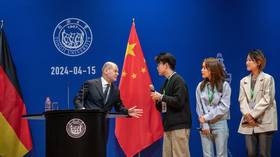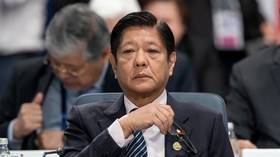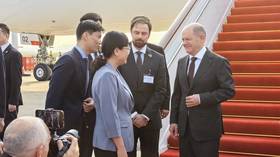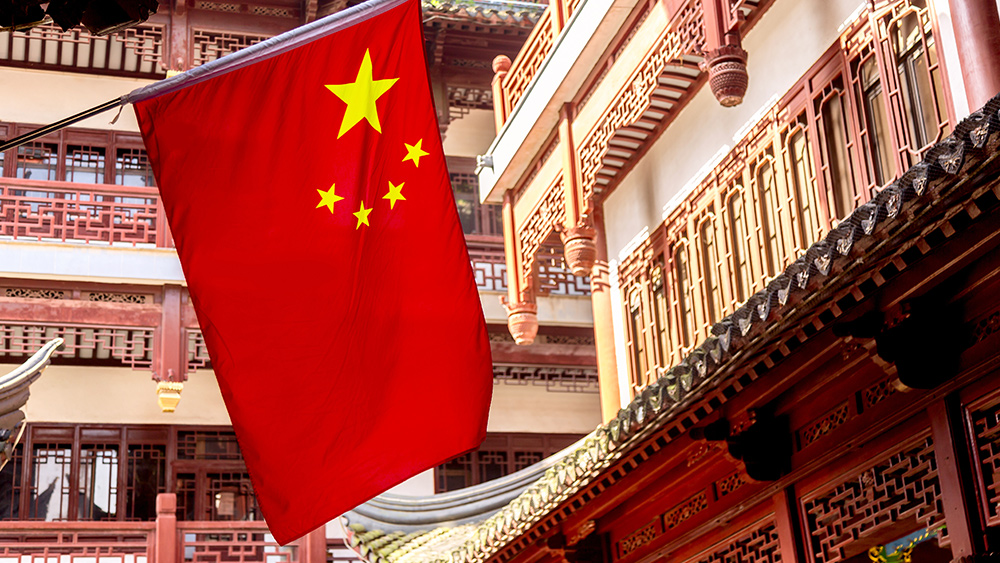Scholz has one trump card in talks with China, but he’ll never use it
The German chancellor has a weak hand to play against Beijing, and he won’t dare do the only thing that could give him leverage
German Chancellor Olaf Scholz is on a three-day visit to China. He is not traveling alone. A large delegation of German business representatives, including from flagship companies such as Mercedes, Siemens, and BMW, is coming along. Scholz’s agenda is ambitious: The chancellor wishes to talk about international trade and competition, climate politics, the tensions over Taiwan, the war in Ukraine and Beijing’s relationship with Russia. Since Iran has just made use of its clear right to self-defense and retaliated following Israel’s illegal attack on Tehran’s diplomatic premises in Damascus, Scholz felt compelled to make a statement about that as well.
Two of these topics tower above the others: matters of trade and the relationship between China and Russia. Regarding trade, the crucial issue is that the West in general – led by the US – has embarked on a policy of de facto economic warfare against China, while constantly threatening to escalate further.
That was the essence of Janet Yellen's recent Beijing trip; the US Treasury Secretary arrived with a list of demands to curb what America denounced as Chinese “overcapacity” and dumping, and left with a blunt warning that “nothing was off the table” in terms of additional strikes against China’s economy.
Then there is the EU, which as usual, follows Washington’s lead. Under hardliners like European Commission President Ursula von der Leyen and Vice President Margrethe Vestager, Brussels is ramping up anti-Chinese rhetoric and measures. Beijing has officially been declared a “partner for cooperation, an economic competitor, and a systemic rival.” With the EU Commission defining “economic security” clearly in opposition to China and launching probes targeting Chinese electric vehicles, wind turbines, and soon the procurement of medical devices, the accent clearly is on competitor and rival.
At the same time, however, German business leaders know that they cannot afford a policy of sustained conflict. A high-ranking Siemens executive has just gone public with a warning that “decoupling” from Chinese manufacturing would take “decades.” That, clearly, is just another way of saying it’s a very bad idea to even try.
Superficially, it may appear that there is an opportunity here for Scholz – an opportunist to a fault – to appear as a mediator or, at least, to deftly balance and weave between competing demands. The Global Times, a media outlet owned by the Central Committee of the Chinese Communist Party, prefaced the chancellor’s visit with a generally welcoming article, depicting Scholz as, in essence, a dove among hawks, arguing that while Foreign Minister Annalena Baerbock and Economic Minister Robert Habeck stand for confrontation, the chancellor is seeking to find a balanced approach.
Yet, even if he wanted to try to be smart and flexible, Scholz is hamstrung in multiple ways. He will struggle to be taken seriously because both Germany and its chancellor lack international standing, and Germany lacks leverage in its relationship with China.
Let’s look at the leverage deficit first: In economic terms, the Chinese-German relationship is substantial and complex. Many factors are important; multiple indicators are relevant, such as, for instance, foreign direct investment (which is currently dipping). But overall trade volumes suffice to show that Germany cannot speak to Beijing from a position of strength or even parity.
China, according to 2023 export data, is still Germany’s single biggest trading partner, as Bloomberg has noted. That is not unusual in today’s world: with the second-largest economy in the world (the largest in Purchasing Power Parity terms), China is the top trade partner for a total of 120 countries. China is also the largest (external) trade partner of the European Union as whole. However, from China’s perspective, Germany ranks only 8th among export destinations, less than the US, Japan, and even Vietnam.
None of the above means that the economic relationship with Berlin does not matter to Beijing, but it does mean that it matters even more for Berlin. Among rational actors, such a pattern of mutual dependency is a reason for cooperation. What it certainly is not is one-sided leverage for Germany. If anyone has the whip hand here, it’s China, which may have tried to “gently” signal this fact with Scholz’s intriguingly low-key, not to say humiliating reception on his arrival in the Chinese manufacturing metropolis Chongqing.
In fundamental terms, Germany, according to data from the International Monetary Fund (IMF), is a country of not quite 84 million people (in China, Chongqing alone is home to over 30 million inhabitants) with projected GDP growth this year down to almost zero (0.5 percent). China has a population of over 1.4 billion, and its GDP is estimated to grow by 4.6 percent.
In sum, China’s economy has problems, such as its over-expanded real estate sector, which are inevitable and often obsessively exaggerated by Western “China doomers.” Germany’s economy is a problem.
The German chancellor can only play a weak hand, due to economics. There is only one way to play it well, and that would involve politics. Scholz could create some room for maneuver for Germany if he did what the Global Times article signaled Beijing would like to see from him: to show some autonomy, a little bit of distance between himself and the hardliners now dominating both Washington and Brussels.
Indeed, for the China hawks in the West, the mere possibility that the German chancellor might go off script is such a nightmare scenario it had to be exorcised in one of America’s two most authoritative journals on international politics. Foreign Policy dedicated a whole article to, in essence, asking if Scholz will chicken out and be too conciliatory toward Beijing. If the Global Times sent an invitation of the “an-offer-you-should-not-refuse” kind, Foreign Policy’s message was “don’t you dare.”
Scholz should dare. It would be only rational because it is really the only trump card he has. As Foreign Policy acknowledges, the EU’s hardball approach cannot work if Berlin is not on board. Without the EU toeing the line, Washington’s game would become much more challenging, too. That is power right there: the power to balance and play both sides.
Unfortunately, this is where we come up against Scholz’s very narrow limits. This is no Bismarck. Instead, we are dealing with a chancellor who can be called the most recklessly and – it must be said, spinelessly – subservient to the US in Germany's post-WWII history. Scholz grinned when Biden announced, in essence, that the US would destroy the Nord Stream pipelines if it felt like it. When it happened, nothing happened: Germany took it and kept grinning.
Under Scholz, Berlin has become a perfect client of the US. Accordingly, there is no real daylight between Berlin and Brussels either; another ultra-Atlanticist German, Ursula von der Leyen, runs the European Commission. True, some observers speculate that Germany is slyly cutting corners, but that will amount to too little, in absolute terms, for Beijing.
The issue of dependency also brings us to the penultimate irony of Scholz’s visit: The German chancellor has let it be known that he intends to challenge Beijing on its policy toward Russia and thus the war in Ukraine. In essence, Scholz seems to believe it is his job – and within his rights – to urge China to loosen its ties with Russia as well as to support the West’s unrealistic proposals for ending the war in Ukraine without acknowledging that Russia is winning it.
There are two things wrong with this astonishingly tone-deaf attitude: First, obviously, neither Germany nor the EU are in a position to make such requests of Beijing. They have neither the arguments nor the power to back them up. In such cases, the wiser and more dignified course is to be quiet. Second, less obviously, who is Scholz to try to interfere in the partnership between Moscow and Beijing, a partnership marked by rationality and respect for both partners’ national interests? As long as Germany offers a spectacle of unquestioning and irrational obedience to Washington, no one will be interested in its advice on how to cooperate.
That was the penultimate irony. Here is the ultimate one: Scholz’s visit is, most fundamentally, an outcome of the fact that the West has not been able to cajole China. With respect to Germany in particular, it is true that, according to a recent poll, two thirds of German businesses active in China complain of unequal treatment. And yet they are there. And yet a German chancellor still arrives with a planeload of business leaders.
The true message of the poll is about how indispensable China is, talk of “derisking” this and “decoupling” that notwithstanding. In the not-too-distant future, a successor of Scholz may well find himself on a similar trip, but to Moscow. Namely, when two realities will have become so compelling that they must be acknowledged: Russia, too, cannot be cajoled by the West; and, for Germany as well as for Europe as a whole, Russia, too, remains indispensable.
The statements, views and opinions expressed in this column are solely those of the author and do not necessarily represent those of RT.






